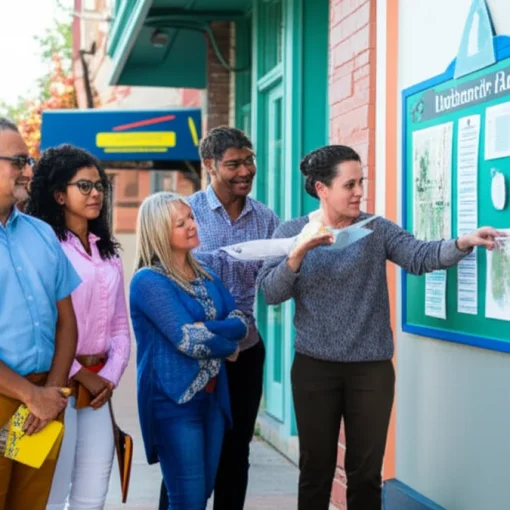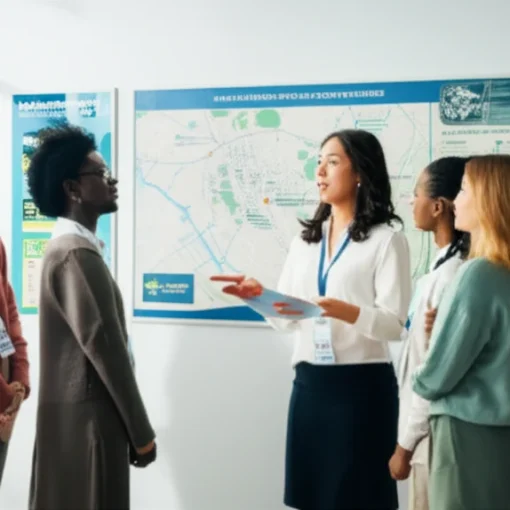Imagine this: You’ve just launched your groundbreaking tech startup in Madison, or perhaps your established manufacturing firm in Milwaukee is trying to pivot into a new, complex product line. You know precisely what kind of research and development (R&D) you need to push past a critical technical hurdle – maybe it’s a materials science problem, a complex software algorithm, or advanced prototyping. The challenge? Hiring the specialized expertise or acquiring the high-cost equipment required for this R&D is prohibitively expensive, far beyond what your current cash flow or a traditional bank loan can comfortably cover.
This is a common scenario for many Wisconsin entrepreneurs and businesses. You need to innovate to compete, but the initial investment in cutting-edge R&D can be a massive barrier. While general business grants exist, they often don’t provide the targeted, high-impact support necessary for deep, specialized R&D.
Enter the Wisconsin Innovation Vouchers program. This isn’t just another grant; it’s a strategically designed state support mechanism that goes far beyond basic grants by directly connecting your R&D needs with world-class expertise housed within Wisconsin’s public universities and colleges. For any business serious about innovation in the Badger State, understanding and leveraging this program is absolutely critical.
Understanding Wisconsin Innovation Vouchers: Strategic R&D Support
At its core, the Wisconsin Innovation Vouchers program is designed to facilitate crucial R&D collaboration between Wisconsin businesses and the state’s public institutions of higher education, primarily the UW System and Wisconsin’s technical colleges. Unlike a traditional grant, which might provide general operational funds or capital for equipment, a voucher is a matching fund program specifically earmarked for engaging university or college faculty, staff, and facilities on a defined R&D project.
The aim is to de-risk innovation for companies by offsetting a significant portion of the cost associated with specialized research, testing, or product development that would otherwise be out of reach. This is powerful state support, strategically deployed to foster economic growth and technological advancement right here in Wisconsin.
Beyond Basic Grants: The Distinct Advantage
What truly sets Innovation Vouchers apart from more generalized funding opportunities? It’s their laser focus and unique structure:
- Targeted Expertise, Not Just Cash: Instead of a check that could be used for anything, the voucher funds a specific R&D project with an academic partner. This means you gain access to highly specialized knowledge, state-of-the-art labs, and equipment that would be impossible or impractical for most businesses to acquire on their own. This is about leveraging the intellectual capital of Wisconsin.
- Matching Fund Model: While the voucher covers a substantial portion (often 50% to 75%) of the project cost, it requires your business to contribute the remaining share. This skin in the game approach ensures commitment and aligns incentives, making the state’s investment more impactful. It’s a partnership, not a handout.
- De-Risking Complex R&D: Innovation often involves high risk and high reward. Vouchers reduce the financial exposure for critical research phases, allowing businesses to explore novel solutions or validate technologies without bearing the full financial burden of potential failure. This encourages more audacious and potentially transformative R&D.
- Accelerated Innovation Cycles: By outsourcing highly specialized R&D to an academic partner, businesses can often accelerate their innovation timelines. They don’t need to hire full-time researchers, purchase expensive equipment, or build out new lab space.
Who Qualifies? Eligibility and Requirements for Wisconsin Businesses
The Wisconsin Innovation Vouchers program targets Wisconsin-based businesses, with a particular emphasis on small to medium-sized enterprises (SMEs) and startups that demonstrate a clear need for advanced R&D. While specific criteria can vary slightly with each funding round, general requirements typically include:
- Wisconsin Business Registration: Your firm must be properly registered and in good standing with the state. This means ensuring your Wisconsin LLC formation or Forming a corporation Wisconsin process was correctly completed. Your business should be registered with the Wisconsin Department of Financial Institutions (DFI), which handles all business entity filings.
- Good Standing: You must be current with all your state obligations, including Wisconsin annual report filing with the DFI. A proper Wisconsin firm name search should have been conducted to confirm unique entity name upon formation, and you should have a designated Registered agent Wisconsin for official communications.
- Project Focus: The proposed project must be bona fide R&D, not standard consulting, marketing, or general company development. It should aim to solve a technical challenge, develop a new product/process, or significantly improve an existing one.
- Financial Contribution: The business must demonstrate the ability to cover its matching share of the project cost.
- Academic Partner: You must identify and secure a project agreement with a faculty member, department, or research center within a UW System institution or a Wisconsin Technical College.
This program is a crucial component of the broader **Wisconsin startup guide for new ventures looking to embed innovation into their DNA from day one.
The Application Process: A Step-by-Step Guide for Wisconsin Entrepreneurs
Navigating state programs can sometimes feel complex, but with the right approach, securing an Innovation Voucher is a straightforward process. The program is administered by the Wisconsin Economic Development Corporation (WEDC)**, the state’s lead economic development agency.
### 1. Solidifying Your Business Foundation
Before you even think about applying for state support, ensure your business entity is impeccable.
- Formalize Your Entity: Whether it’s a Wisconsin LLC formation for flexibility or Forming a corporation Wisconsin for scalability, ensure your legal structure is robust. This is a prerequisite for any formal engagement or funding from state bodies.
- DFI Compliance: Verify your enterprise is actively registered with the Wisconsin Department of Financial Institutions (DFI). Check your good standing.
- Name & Agent: Confirm your Wisconsin business name search secured a unique name, and you have a reliable Registered agent Wisconsin to receive critical documents.
- Annual Reporting: Stay current with your Wisconsin annual report filing. Non-compliance can disqualify you from state programs.
### 2. Identifying Your Critical R&D Need
This is where the rubber meets the road. Don’t just seek a voucher for the sake of it. Pinpoint a specific, well-defined technical challenge that, if solved, would significantly advance your product, process, or market position.
- Example: A small brewery in Green Bay wants to develop a proprietary yeast strain that thrives at lower temperatures to reduce energy costs. This is a specific R&D problem.
- Example: A tech startup in Milwaukee needs to validate the material properties of a new composite for their drone design – a clear testing and analysis R&D need.
### 3. Finding the Right Academic Partner
This is perhaps the most unique aspect of the voucher program. You’re not just asking for money; you’re seeking expertise.
- Reach Out: Engage with the technology transfer offices or research liaisons at UW-Madison, UW-Milwaukee, other UW System campuses, or Wisconsin Technical Colleges. They are often keen to connect industry with academic talent.
- Clearly Articulate Your Need: Present your R&D challenge clearly. Be prepared to discuss your organization goals, the technical specifications, and the desired outcomes.
- Develop a Project Scope: Work with the academic partner to define a detailed scope of work – including deliverables, timeline, and budget. This will form the basis of your voucher application.
### 4. Crafting a Compelling Proposal
Once you have a project and a partner, you’ll work together to prepare the formal application for WEDC.
- Innovation & Impact: Clearly articulate the innovative aspects of your project. How is it new or significantly improved? What is its potential economic impact for Wisconsin (job creation, new market entry, increased sales)?
- Technical Merit: Explain the R&D methodology and why the chosen academic partner is uniquely qualified to execute it.
- Budget Justification: Provide a detailed breakdown of costs, showing how the voucher funds and your matching contribution will be utilized.
- Business Readiness: Demonstrate that your business has the capacity and commitment to commercialize the results of the R&D. This ties back to your overall business plan and strategy, as outlined in any good Wisconsin startup guide.
### 5. Submission and Review via WEDC
All applications are submitted directly to the **Wisconsin Economic Development Corporation (WEDC). Their team evaluates proposals based on the criteria outlined above, looking for projects with strong technical merit, clear economic impact potential, and a solid partnership between the firm and the academic institution. WEDC representatives are often available to answer questions and supply guidance throughout the application process.
Maximizing Your Voucher’s Impact: Beyond the Award
Receiving an Innovation Voucher is a significant achievement, but it’s just the beginning. To truly leverage this state support, consider these actionable insights:
- Active Project Management:** Treat your R&D project with your academic partner as seriously as any internal project. Maintain regular communication, give necessary resources, and guarantee milestones are met. Your active involvement is crucial for success.
- Intellectual Property (IP): Clarify IP ownership at the outset. Generally, the intellectual property developed through an Innovation Voucher project belongs to the company, but ensure your agreement with the university/college reflects this clearly. This IP can be a cornerstone of your future competitive advantage.
- Strategic Follow-Up: How will the R&D outcomes lead to commercialization? Will it result in a new product, a patent, a more efficient process? Plan your next steps – whether it’s further development, market entry, or seeking additional funding.
- Long-Term Relationships: The partnership forged during the voucher project can be invaluable. It can lead to future collaborations, talent acquisition (e.g., hiring students who worked on your project), or access to ongoing academic insights.
Conclusion: A Powerful Tool for Wisconsin Innovation
The Wisconsin Innovation Vouchers program is more than just financial assistance; it’s a strategic investment in the state’s R&D ecosystem. By fostering direct collaboration between Wisconsin businesses and its world-class academic institutions, it effectively bridges the gap between scientific discovery and commercial application.
For any entrepreneur or established business looking to innovate, this program offers a unique pathway to accessing specialized R&D capabilities that truly go beyond basic grants. It empowers you to tackle complex technical challenges, accelerate your product development, and ultimately, secure a lasting competitive edge in your market. Don’t let a lack of specialized resources hinder your innovation. Explore how Wisconsin Innovation Vouchers, facilitated by the Wisconsin Economic Development Corporation (WEDC), can be the catalyst for your next big breakthrough. Your next innovative leap might be just a university partnership away.




